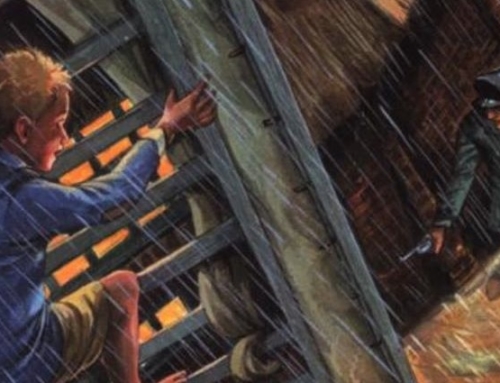Writing poetry helps a reader understand excellence. Reading poetry without ever having tried to write in verse is like watching baseball without ever having felt the seams of a ball or pounded your fist into the web of a glove or swung a bat and felt the sweet, solid contact.
 Earlier this semester, the poet and critic James Matthew Wilson visited Wyoming Catholic College to give a reading from his book, The Strangeness of the Good. In introducing the poems from a section called “Quarantine Notebook,” he described the process of writing in blank verse (unrhymed iambic pentameter) during the Covid-19 shutdowns in the spring of 2020. What did he write about? In the next to last poem, “May 14, 2020,” Wilson [pictured above] explains that his brother, back at work and unphased by Covid, called him:
Earlier this semester, the poet and critic James Matthew Wilson visited Wyoming Catholic College to give a reading from his book, The Strangeness of the Good. In introducing the poems from a section called “Quarantine Notebook,” he described the process of writing in blank verse (unrhymed iambic pentameter) during the Covid-19 shutdowns in the spring of 2020. What did he write about? In the next to last poem, “May 14, 2020,” Wilson [pictured above] explains that his brother, back at work and unphased by Covid, called him:
“Do you just write about whatever happens
Around the house or in the yard?” he asks.
“I worked my shed into a poem last week,”
I say, “So, yeah, I guess.” Outside my window,
The songbirds raise a fugue of rapid twitters,
And crows erupt with loud, shrill interjections.
The poem goes on for two more pages. Wilson credits the editors of Dappled Things, Bernard Aparicio and Katy Carl, for encouraging him and making it possible “for others to read the poem even as the events it describes were taking place.”
I asked Katy Carl, who edited my second novel for Wiseblood Books, what the nature of her collaboration was. She wrote that “the Quarantine Notebook poems appeared first on Deep Down Things [the blog on the Dappled Things website] in real time during those first several weeks of viral spread in 2020. We put them up almost as soon as James wrote them, sometimes just a few days apart, with other intervals closer to a week or ten days. My main contributions were, first, saying yes to the project, and then standing back and gawking in wonder at the elegant, wise, profound work James was so consistently producing throughout those uneven, uncertain weeks and months.” Reading Katy’s remarks, I think of Jacques Maritain in Art and Scholasticism when he describes art as “a virtue of the practical intellect,” a habitus, one of those “intrinsic superelevations of living spontaneity, vital developments which render the soul better in a given order and which fill it with an active sap.” Dr. Wilson was demonstrating the habitus of the poet in action.
After the reading that Friday night, Dr. Jeremy Holmes, Wyoming Catholic’s academic dean, asked whether Dr. Wilson thought that students in a good curriculum should be required to write verse. Dr. Wilson replied that most of the poets in the earlier English tradition went through training in classical languages, certainly including composition in meter. In other words, why not? Our contemporary habits of thought might rebel against this suggestion. Shouldn’t poets be moved to write by sensitivity and insight and native talent? Can every student be required to write verse—and then graded on the result—as though it were the same as writing an essay on Huckleberry Finn or the Iliad?
Twice in my teaching career, I have asked students to write a poem as one of the requirements for a writing course. I asked for a Petrarchan sonnet, which meant that it should be fourteen lines of iambic pentameter, divided into the octave (eight lines) with an abbaabba rhyme scheme, and the sestet (six lines) with a different rhyme scheme, preferably cdecde. The octave should set up a problem or situation (for example, Wordsworth’s complaint that “the world is too much with us”) that the sestet would answer or address. For some students, though it was not easy, it was a welcome and pleasant exercise. Several of them wrote vivid sonnets and demonstrated a talent they had perhaps not fully recognized. What if young Will Shakespeare had never been required to compose in Latin verse? Would he ever have realized his talent or explored the possibilities of English? Thomas Gray imagines a “mute inglorious Milton” buried in a country churchyard.
Others of my students were probably like Shakespeare’s schoolmates in Stratford: it was torment. How could they force the living intensity of their thought into the shackles of iambic pentameter in lines that not only had to rhyme but also had to make sense and even be emotionally engaging? Squeezing out a sonnet took weeks of effort and revision; it was painful to witness. I remember one older student who confessed to me that he simply couldn’t get the idea of meter, and his sonnet proved it. As with math for some, he had a mental block. It’s as though he had received instructions to move forward across the room by starting to fall forward and advancing one foot at the last split-second to keep himself upright and then repeating the movement with the other foot and then reenacting the sequence, which sounds awkward, unnatural, lurching. But how else do you describe walking? The description of meter seemed just as unnatural to him (counting syllables, paying attention to lighter and heavier stresses, etc.), but later that same year I heard him singing songs that he had written—beautiful, moving ballads. He never suspected that he had written them in traditional English meter.
Writing poetry helps a reader understand excellence. Reading poetry without ever having tried to write in verse is like watching baseball without ever having felt the seams of a ball or pounded your fist into the web of a glove or swung a bat and felt the sweet, solid contact. How do you really appreciate a great shortstop or third baseman if you’ve never seen a ground ball come screaming at you so fast that everything is reflex? Or a great outfielder if you’ve never run across the grass, gauging the trajectory of a fly ball? We’re embodied creatures. It takes experience to feel both our capacities and our limits, and that same experience enables us to recognize and judge real excellence that exceeds our own. Our outdoor program is hands-on. I’m thinking now that the same should be true of what we ask of our students in writing. “True ease in writing comes from art, not chance,” writes Alexander Pope, “As those move easiest who have learn’d to dance.” Maritain would agree—and so would James Matthew Wilson. Students of poetry need to get their bodies into the language to get the measure of the game.
Not too long ago, I was talking to a senior who described to me the biggest sky he had ever seen on his recent canyoneering trip over the outdoor week earlier this month—no moon, a splendid array of stars that felt like “more than 180 degrees.” There’s a sonnet in it, I suspect, like Keats’s “On First Looking into Chapman’s Homer”—an octave of front country, ordinary days, and study, then a sestet of blazing, heavenly fire. In this unique curriculum, I’m increasingly convinced, writing poetry should be required.
Republished with gracious permission from “Keeping Our Bearings,” a weekly column of Wyoming Catholic College.
The Imaginative Conservative applies the principle of appreciation to the discussion of culture and politics—we approach dialogue with magnanimity rather than with mere civility. Will you help us remain a refreshing oasis in the increasingly contentious arena of modern discourse? Please consider donating now.







My sophomore (public) high school students used to dread our “Poetry Unit” in principle, but they knew that, at its end they would be required to write the “That One Kid” poem and THAT they had heard about from the previous year’s students. And so, they would put up with rhyme schemes & meter & assonance & all the rest of the skills in order to write this one poem.
“That One Kid”
1. Write a sonnet, a villanelle, or a sestina.
(Yes, you must follow the form you choose. No fudging.)
2. The title is “That One Kid”
3. Not counting the title, the phrase “that one kid” 5, 7, or 9 times, depending on the form.
Twice the phrase will be toward the beginning a line; twice it ends a line; once it is in the middle.
(If you have more than 5 because of your form, you can place them as is appropriate.
[Notice the lack of “content” directions; only form. This had the most freeing effect on them.]
Students got two class days to work on the initial draft and ask questions; the final draft (after a few conferences, if desired) was due two weeks later.
Students would read “Read” or “Don’t read” at the top. Those so marked I would read aloud to the class, but without any author attribution.
I have had some poems each year in Spanish, or Latin, or French, and, for a couple years, in Burmese (which required a phonetic guide as well as a translation). Through this assignment I have read some of the most brutal, tender, honest, accusatory, exculpatory, loving, painful, inspiring, and exultant verse. And it is the one work my students took away with them and referred back to over the years.
Sadly, our “state standards” no longer specify “writing poetry” as a “tested standard” so, while I might still assign it, I cannot grade it except as a “completion grade,” and that is unfair to the effort and skill my students poured into it. Consequently, it was dropped from our curriculum.
I am retiring from public school teaching in 14 days after 39 years, private and public.
I have no regrets for what I have taught in the past, but I equally have no regrets as to the future.
For any who would use this assignment, please consider it my gift & my honour to pass along.
Ratio Studiorum
(for Dr. Glenn Arbery)
This was the seed of Jesuit success
Back in the day. Eschew all modern doubt
And read the Ratio. There you’ll find out
That verses were assigned – in Latin, yes,
And Greek. With free verse students didn’t mess:
Established forms were what they learned about
And practiced, putting formlessness to rout
And overcoming chaos – more or less.
They emerged from their season of tuition
So eloquent that devils flew away
From argument. As Heaven’s politician,
The Jesuit impressed with his display
Of verbal skill in service of his mission.
(They do not train them quite that way today.)
–Tom Riley
Sicilian Sestet
(for Dr. Glenn Arbery)
You’re wrong about the sestet, Dr. Glenn.
Sicilian is the way you ought to go:
Cdcdcd – a two-rhyme show
Just like the octave. How I shudder when
That e-rhyme gives its first peep – then again
Intrudes upon the ear! My heart cries: “No!
You’re soaring high already. Why sink low?”
Angels approve my cordial cry: “Amen!”
Anyhow, that’s the way it is for me.
I do not like to judge, but judge I do
On grounds of difficulty, euphony,
And some deep inner gripe that growls anew
Every time that I hear that whining “e.”
I hope this argument convinces you.
–Tom Riley